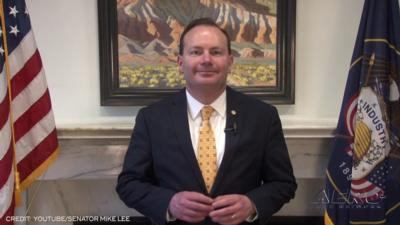Aviation Empowerment Act, In Particular, Is Raising Eyebrows...
Sen. Mike Lee (R-Utah) has introduced four bills, 'to improve and encourage innovation in the U.S. aviation industry: the Aviation Empowerment Act, the Flight Sharing Freedom Act, the Screening Partnership Reform Act, and the Air Traffic Control Safe Operations and Readiness Act.'

The Aviation Empowerment Act would address outdated FAA rules and regulations that stifle innovation within the general aviation sector by preventing participation in the “sharing economy.”
Currently, “private pilots” may carry a small number of passengers only by coordinating on physical bulletin boards to share flight costs. They are prohibited from coordinating on online platforms, and deemed “common carriers,” like a major airline, if they do so. Since the FAA has not defined “common carrier” in federal law, the FAA has broad authority to determine who and what meets its regulatory interpretation. Furthermore, current federal law prohibits private pilots from receiving compensation for the transport of persons or property.
The Aviation Empowerment Act would help bring 21st century innovation to aviation by correcting these oversights to allow a “flight sharing” economy. In particular, the bill would:
- Codify a definition of a “common carrier” based on the FAA’s own internal regulatory definition
- Reverse the FAA’s ban on online flight-sharing by allowing private pilots to communicate with the public through the internet, or in any manner they deem appropriate
- Create a “personal operator” category of pilot who may fly 8 or fewer passengers for compensation and not be deemed a “common carrier”
The Flight Sharing Freedom Act includes two of the reforms in the Aviation Empowerment Act to correct the outdated rules that prevent flight sharing. Specifically, it would:
- Codify a definition of a “common carrier” based on the FAA’s own internal regulatory definition
- Reverse the FAA’s ban on online flight-sharing by allowing private pilots to communicate with the public through the internet, or in any manner they deem appropriate
The Screening Partnership Reform Act would make changes to the Transportation Safety Administration’s (TSA) Screening Partnership Program (SPP), which allows TSA to contract with private companies to carry out its screening services.
The Government Accountability Office (GAO) has estimated that the program cuts costs for participating airports by 11%, compared to TSA’s screening. However, the full potential of the program has not been unlocked due to a number of policies that disincentivize airports and security companies from participating.
The Screening Partnership Reform Act would clear some of the bureaucratic red-tape surrounding the program in an attempt to unleash the full cost-saving benefits and further innovation within the SPP, while still safeguarding aviation security. In particular, it would:
- Statutorily require TSA’s cost estimation process to account for total costs to the federal government
- Give airport operators a role in selecting a private screening company for their airport
- Allow private screening companies to conduct on-site training rather than traveling to a Federal Law Enforcement Training Center
- Allow private screening companies to submit recommendations to TSA on new and innovative approaches to screening
- Clarify ambiguities in hiring practices during transition from TSA to private screening
The Air Traffic Control Safe Operations and Readiness Act, or ATC SOAR Act, is designed to decrease the number of applicants that flunk out of the air traffic control academy.
In 2014, the Federal Aviation Administration (FAA) instituted hiring reforms that prioritized diversity quotas over experienced, qualified candidates through implementing a biographical questionnaire. When Congress prohibited the questionnaire in 2016, the FAA then put the biographical assessments into its Air Traffic Skill Assessment (AT-SA) test. The FAA does not report any information on how AT-SA is graded, and more specifically how the biographical questions factor into the overall score an applicant receives.
The ATC SOAR Act would restore common sense hiring practices to keep our skies safe and ensure that qualified, experienced controller candidates are prioritized. Specifically, the bill would:
- Instruct the FAA to consider candidates for interviews based on their qualifications and their score on the AT-SA test
- Instruct the FAA to revise the AT-SA test to only include peer-reviewed, job-relevant aptitude questions
- Prohibit any biographical questions on the AT-SA test other than basic identifiers (first name, last name)
- Require the Inspector General of the Department of Transportation to report to Congress an assessment of the test methodology, the aptitude questions, and the scoring methodology
 Airbus Racer Helicopter Demonstrator First Flight Part of Clean Sky 2 Initiative
Airbus Racer Helicopter Demonstrator First Flight Part of Clean Sky 2 Initiative Diamond's Electric DA40 Finds Fans at Dübendorf
Diamond's Electric DA40 Finds Fans at Dübendorf ANN's Daily Aero-Term (04.23.24): Line Up And Wait (LUAW)
ANN's Daily Aero-Term (04.23.24): Line Up And Wait (LUAW) NTSB Final Report: Extra Flugzeugbau GMBH EA300/L
NTSB Final Report: Extra Flugzeugbau GMBH EA300/L Classic Aero-TV: 'Never Give Up' - Advice From Two of FedEx's Female Captains
Classic Aero-TV: 'Never Give Up' - Advice From Two of FedEx's Female Captains



